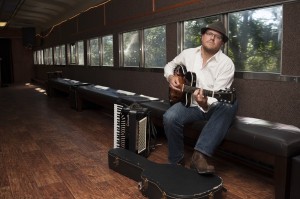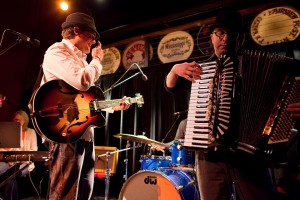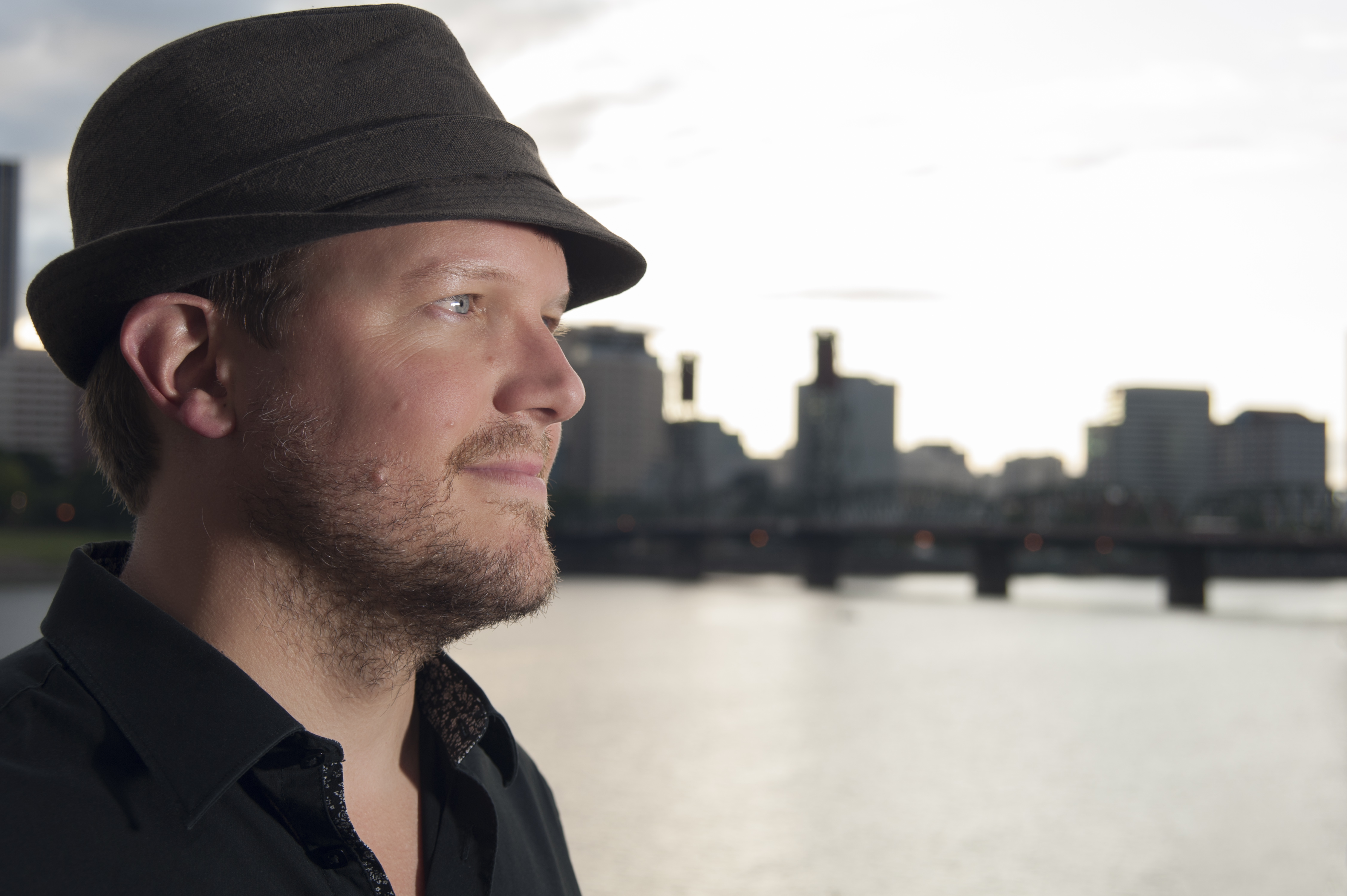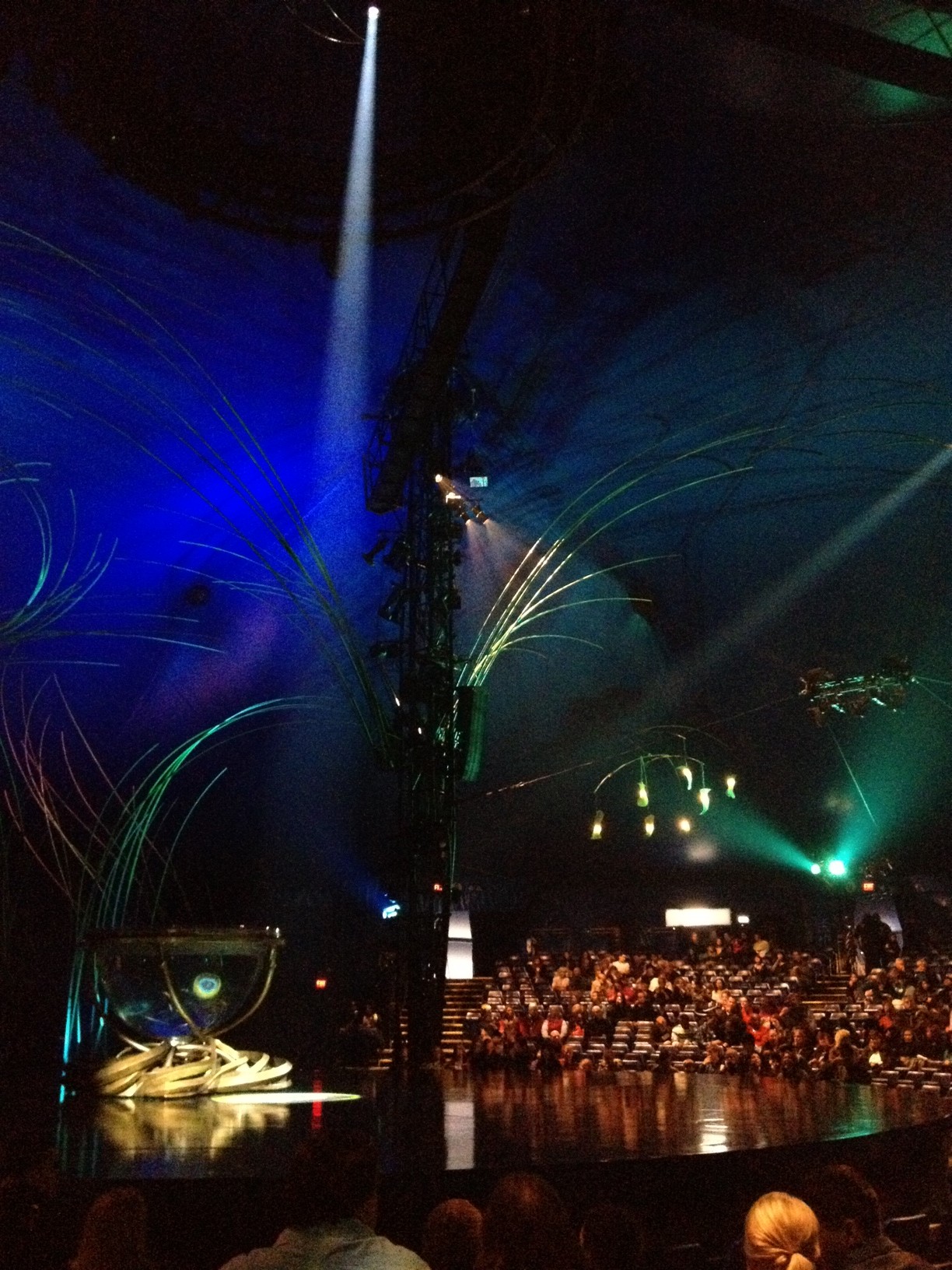I recently made friends via Twitter with musician Eric John Kaiser, a native Parisian who now lives in Portland, Oregon. Like many who make a living full time from music, Eric is a busy person, juggling several different sources of income, as you will read below.
Eric has managed to successfully carve out a niche for himself in the Portland musical ecosystem playing “French music” several days a week. I thought it would be helpful for other musicians to read some of the smart and practical things he does to find, classify and promote his local and regional gigs. I also feel it is worth highlighting how Eric does business as a musician: he treats bookers and the other musicians he works with respectfully, fairly and professionally.
Question 1: Tell our readers a little about yourself: your music, where you are from, and how you ended up in Portland.
EJK: I’m a professional singer-songwriter originally from Paris, France, now based in Portland, Oregon, USA. After doing over 350 gigs in France and several records, in the summer of 2006, I followed a girl from Portland whom I met in Paris. Now I tour mainly on the West Coast, Idaho and Montana, in Louisiana and in Quebec and some parts of Canada. I also go back to France to tour once a year. I have released, at this point, three full length albums and three EPs. It’s been a great musical adventure so far.
Over time, I’ve learned that I needed to be flexible and be able to play solo gigs, as a duo with my accordion player or play with my full band.
Question 2: Eric, I think it’s great that you perform often locally in the Portland area and make a living as a full time musician. That’s a great accomplishment! How often do you perform and what are the different kinds of gigs you get?
EPK: Thanks for the kind words. I usually perform between three and five times a week. Usually summers are a bit more busy because I get more outside gigs. Over time, I’ve learned that I needed to be flexible and be able to play solo gigs, as a duo with my accordion player or play with my full band. When I first moved to Portland, I actually started from scratch, busking during the summer, playing some open-mics and coffee shops. I also went to see French owners at French restaurants to see if they needed any French entertainment. It worked pretty well, actually. It was a good way to start selling CDs and build a fan base. I was also one of the only ones in Portland able to play certain French songs, and the only native Parisian musician around. I had my niche. I built things from there. For each show, I have a mailing list available where people can sign up. I often think that gigs are sometimes more about connecting with people that the actual art itself.
If there is not that much money involved, I usually do the gig on my own.
Over time, I’ve also learned how to be pragmatic with money. If there is not that much money involved, I usually do the gig on my own. Although I enjoy working with the same musicians and performing with them, and have the same regular band line up, I function more as a songwriter than as a band. I have this rule that I pay every musician that plays with me a minimum guarantee whatever the gig (even if it’s a door deal and I lose money). If I’m fortunate to get a high-paying gig (like a wedding or a private party), I pay my musicians more. Even though, I really enjoy playing with them, they are basically working for me and are my employees. I’m the one taking the financial risk, they are supporting my project. I think every artist has his own way of functioning, I found out over time that this is what works best for me.
I tell the person booking that I know how to play Tom Petty, Radiohead or Beatles tunes.
From an artistic perspective, I’ve also learned how to play many different types of music and have a wide catalog of songs I could play. It helps me find work. For example, when I first try to get in to play in a pub or a brewery, I tell the person booking that I know how to play Tom Petty, Radiohead or Beatles tunes. When I play in a French bakery or a fancy French restaurant, I mix my own songs with more French classic tunes from Edith Piaf, Jacques Brel, or Georges Brassens. It really depends on the audience and the crowd you are playing for. I’ve learned over time that for many “wallpaper” gigs that I do, I’m basically providing the person hiring me a service.
I’m fortunate to be in a particular niche, the French one. Being able to offer something unique is definitely an advantage.
 Portland is a relatively small market, and since there are many very talented musicians here, it can be hard to find gigs on week days. So I’ve also learned how to diversify what I do. At this point, I make a living doing gigs but also hosting a Songwriter Showcase once a week, doing French concerts for kids in local French schools and I also book two small clubs in town.
Portland is a relatively small market, and since there are many very talented musicians here, it can be hard to find gigs on week days. So I’ve also learned how to diversify what I do. At this point, I make a living doing gigs but also hosting a Songwriter Showcase once a week, doing French concerts for kids in local French schools and I also book two small clubs in town.
I’m fortunate to be in a particular niche, the French one. Being able to offer something unique is definitely an advantage.
Question 3: How frequently do you tour?
EJK: I usually tour once a year, or twice a year when I release a CD. I try to tour mainly on the West Coast, including Vancouver BC, in Idaho and Montana – in other words places where I can drive to from Portland. I’ve also toured in Louisiana, in Quebec and on the East Coast a few times. It’s always a lot of fun, but a lot more work since I have to fly over there and cannot always bring my band with me. I usually try to get one or two anchor gigs before looking for other gigs. It’s important to have local connections too.
Question 4: That leads right into my next question. How do you get gigs?
EJK: Basically it goes in 4 steps: do some research over the web on venues that have live music, make phone calls to get the contact of the person booking, send an email and do follow up. Of course it’s not an exact science, and most of the time you do not get any answer. That’s pretty common.
Booking gigs is very time consuming and difficult to do. It’s a sales job. Except that I’m the product!
I try to work on my booking at least 3 times a week. Even if it’s only an hour at a time. I think it’s better than doing it once every two weeks by big chunks. For me, regularity is key. At least that’s the way I function. Also I have spreadsheets with contact lists of my clients and take notes on phone conversations I had, in order to remember what was said. Also, each person booking a venue functions differently. Some book 6 months in advance, others from one month to the other. To be aware of that can avoid some disappointments. Booking gigs is very time consuming and difficult to do. It’s a sales job. Except that I’m the product!
Also I think different types of gigs need a different type of approach. It is different if you are providing a service than if you are the one “producing” the show. If you are getting hired to play a “wallpaper” gig, where you were be playing more background music, you are providing a service. To give an extreme example, don’t pitch your heavy metal band to play at a lounge wine bar! I think it’s always important to understand what the needs of the club are. They want to know what they are paying for. I think it’s also important to put yourself in the buyer’s shoes and understand their perspective.
I try to make those shows a special event, something unique that people don’t want to miss
On the other hand, if you are the one taking the financial risk and, for example, working on a door deal, things are a bit different. Try to find other bands to share the bill with you. Promotion in that situation is key. I try to make those shows a special event, something unique that people don’t want to miss – a CD Release show, a going away on tour party, a show related to a cultural event (Mardi Gras, Bastille Day, etc…). Most of the time you are the one responsible for promoting the show and getting people into the door. The booker of the club is going to want to know how many people you can bring to the venue, but in the end it’s the artists taking the financial risk.
Question 5: Again, you led me right into my next question, Eric. How do you promote your gigs?
EJK: I use Facebook and Twitter a lot. I also send emails out to people on my mailing list. Posters and fliers are also still a good tool. For certain shows, I hire someone to put up posters all over town. Being in a specific niche, I also put up posters in places where “Francophiles” gather: French restaurants, French bakeries, French schools, etc.. For bigger shows (CD Release, special events), I hire a local publicist to try and get some local press and radio coverage.
I actually sat down one day in front of a map of the Portland Metro area and drew a 30 mile radius circle around Portland.
Question 6: How do you deal with the potential problem of “oversaturating” the local market with your music?
 EJK: I actually sat down one day in front of a map of the Portland Metro area and drew a 30 mile radius circle around Portland. I then worked on booking different markets that are far enough from Portland (outside that circle) so that people don’t really go to Portland to see shows, but close enough so I don’t have to sleep there after the show and I can drive home. I try to play in these markets about every 2 or 3 months. For Portland itself, I space out the shows with my band every 3 months in order to make it a special event and to try and draw more people in the door.
EJK: I actually sat down one day in front of a map of the Portland Metro area and drew a 30 mile radius circle around Portland. I then worked on booking different markets that are far enough from Portland (outside that circle) so that people don’t really go to Portland to see shows, but close enough so I don’t have to sleep there after the show and I can drive home. I try to play in these markets about every 2 or 3 months. For Portland itself, I space out the shows with my band every 3 months in order to make it a special event and to try and draw more people in the door.
Question 7: Do you have any other words of advice, tips and tricks for other indie musicians about local gigging?
The email does not need to be three pages long and explain everything you have done so far. People don’t have much time to read what you sent them.
EJK: Since I started doing some booking for two small clubs in Portland, I’ve learned a lot about the things that bookers have to deal with. The first advice I would give to bands is to try and make the booker’s life as easy as possible. Once you’ve found out who takes care of booking, send them a concise email with a direct link on where they can listen to your music. The email does not need to be three pages long and explain everything you have done so far. People don’t have much time to read what you sent them. Just a short bio, and link where to listen to your music. Do not attach mp3s of your songs. A clean professional live video is also a great tool. It shows what you sound like on stage. Also, I would do some research before hand to make sure your style of music fits the venue’s style. It goes back to knowing who your audience is and what kind of people enjoy your music. Is it the same as the venue’s audience?
Try not to take things personally and never take things for granted. Nobody owes you anything.
Also, and this is a hard one, try not to take things personally and never take things for granted. Nobody owes you anything. It takes a lot of time and effort to score a gig. At least, that’s how I see it. There are a lot of bands out there and a lot of people pitching gigs. Be patient cordial and professional. I know as songwriters we are putting ourselves out there, and it’s hard to deal with rejection, but many times the people doing the booking in small clubs, wine bars or pubs also manage the place, own the place or have many other battles to fight. So they don’t always have time to answer emails the next day or they even forget. It’s very time consuming. So it’s really all about networking and building relationships with bookers. I see it as a marathon not a 100 meter sprint.
I see it as a marathon not a 100 meter sprint.
One last trick would also to find a small catchy sentence that describes what you do, like a “sales pitch” in a way. For example I call my music “Parisian Americana”. Hopefully it gives the person who is going to listen to my music an idea of what they are going to hear and hopefully ‘buy”. Every artist has something unique. Try to focus on that. Find what makes you unique. I’m not saying it’s easy, but it’s worth a try. Maybe ask some friends that know you for some perspective and advice.
Thank you so much for your advice, Eric! I can tell that a big part of your success as a musician comes not only from your music, which I love, but also from your sense of professionalism, determination, fairness and positivity!
EJK: Don’t hesitate to contact me with if you have any questions. I hope all this helps. My website is:
my Twitter handle is @ericjohnkaiser and my Facebook page is




4 comments
Great interview with Eric on being a full time musician and making a living as one. I can totally relate. It’s not easy at first but you have to start thinking like a sales person. I’ve been performing as a Solo instrumental guitarist for about 3 and a half years now and I’m now close to being a full time musician. Don’t just play at Bars, there are all kinds of gigs for musicians (especially soloist) can do: Museums, Festivals, Private partys, Retail business, Restaurants, Wineries, Country club, and more…..Great job!
Victor – Thank you for your comments! I agree. Here where I live in Washington State, there are many of those kinds of opportunities to play, especially the wineries 🙂 It’s a great insight – you do need to think like a salesperson. I think that’s one of the hardest things for many musicians, to think of their art also as a business. Best wishes for yoru continued success!
Thank you, Solveig and Eric, for the great ideas — in the present music climate it is very refreshing to hear someone tell how they are making it work to be a full-time musician 🙂
Thanks, Diane! I agree. Eric is a great role model.